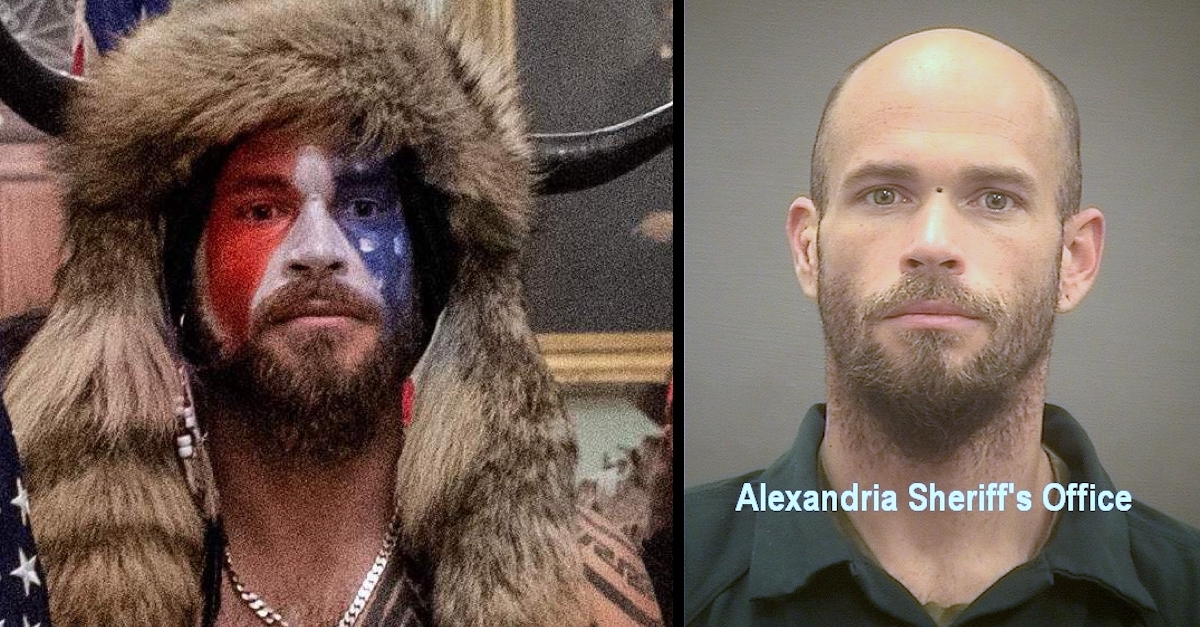
Jacob Chansley, the QAnon Shaman, is seen at the U.S. Capitol in a Jan. 6, 2021 Getty Images photo. He is also seen in a Feb. 4, 2021 mugshot released by the Alexandria, Va. Detention Center.
Jacob Chansley, also known as the “QAnon Shaman” of the Jan. 6th siege on the U.S. Capitol, has asked a judge to dismiss one of the six charges against him, claiming that it was “erroneously charged.”
In a court filing Tuesday, Chansley’s attorney Al Watkins argues that the second count against Chansley, Obstruction of an Official Proceeding, shouldn’t apply to his client.
The law at issue, 18 U.S.C. § 1512, prohibits “tampering with a witness, victim, or an informant.” Section 1512(c)(2), which Chansley is specifically charged with violating, sets a penalty of up to 20 years in prison and/or a fine for someone who “corruptly . . . otherwise obstructs, influences, or impedes any official proceeding, or attempts to do so[.]”
Watkins argues that the “proceedings” his client is charged with interrupting are outside the bounds of what the law was meant to protect.
“The Ninth Circuit has carefully considered and recognized, based on the plain language of the statute, an offense under Section 1512(c) does not prohibit the obstruction of every governmental function; it only prohibits the obstruction of proceedings related to the administration of justice that take place before a tribunal,” Watkins wrote. “Stated differently, Section 1512(c), by its plain language, does not criminalize the obstruction of legislative action by Congress. Any alleged obstruction of the certification of an electoral college vote is simply outside of the reach of Section 1512.”
Watkins also argues that the indictment didn’t specify which “official proceeding” Chansley is alleged to have obstructed, and this lack of specificity amounts to a violation of Chansley’s constitutional rights.
“Count Two of the indictment is flawed because it fails to specify what ‘proceeding before Congress’ Mr. Chansley allegedly obstructed and, more importantly, whether it relates to the administration of justice,” Watkins wrote. “Indeed, courts have limited the reach of Section 1512 by holding that obstructive conduct is proscribed insofar as it affects a proceeding that is judicial in nature.”
Chansley’s motion to dismiss the obstruction count against him wasn’t the only movement in the organic food-fan’s case Tuesday. He also filed a motion for a bill of particulars, asking for more details on each of the charges against him. Watkins, Chansley’s attorney, wrote that the motion is “necessary for [Chansley] to understand the charges against him so that he may adequately prepare his defense and not be subjected to unfair surprise at trial.”
District of Columbia Judge Royce Lamberth also set a hearing Wednesday for Chansley’s motion to be released from custody.
Chansley is one of the more notable figures to emerge from the siege on the U.S. Capitol by Donald Trump supporters. Since his arrest, he has gone on a hunger strike, given an interview to 60 Minutes+ (which seems to have backfired), and has been ordered to undergo a psychological exam.
Chansley has also distanced himself from the former president. And Watkins has been less than graceful in his own references to the various Jan. 6th defendants — all in an attempt, he has said, to draw attention to the issues their cases present.
Read Chansley’s motion to dismiss below:
[Images via Getty/Alexandria, Va. detention center]